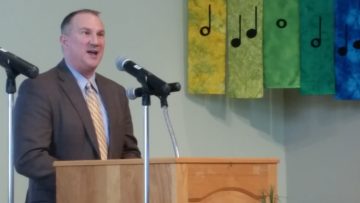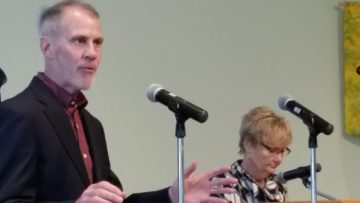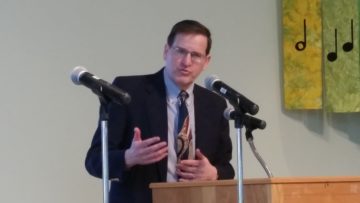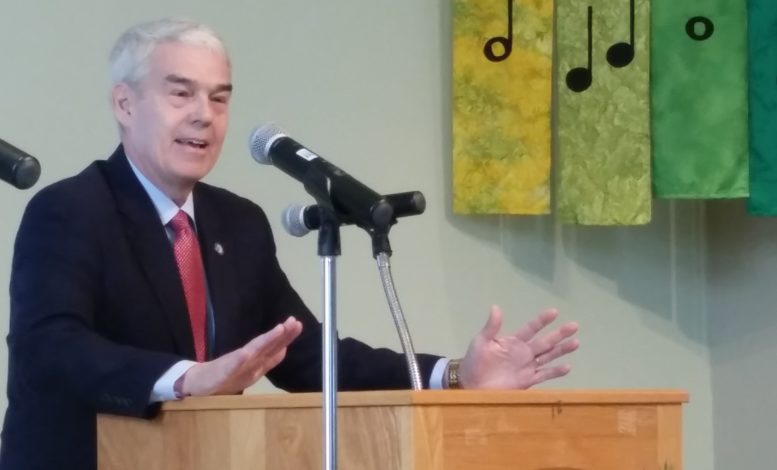By JAN LARSON McLAUGHLIN
BG Independent News
If you want to make your words count with politicians, forget the form letter. Face-to-face conversations are best. Personally written letters and phone calls also carry some weight. But email form letters are next to worthless – especially if you forget to put your name in the “insert your name here” slot – which oddly enough, many people do.
“Personal contact is best, if you can,” State Senator Randy Gardner, R-Bowling Green, said Saturday during the second in the three part series on “Civics 101: Get Informed. Get Engaged. Get Results.”
Gardner was joined in the “All Politics is Local” program by former State Rep. Tim Brown, Bowling Green City Council members Bob McOmber and Sandy Rowland, and Wood County Probate and Juvenile Court Judge David Woessner.
The “Civics 101” project is the brainchild of local citizens who were moved by the last election to become more engaged in the workings of government.
“I know people are cynical about politics,” Gardner told the crowd. But individuals can make a difference in government. And despite what many people think, it’s not about the money for many politicians, he said.
“That’s not true for most,” Gardner said.
It’s the chance meeting with a physician at a Kiwanis pancake breakfast about the need for children to carry their asthma inhalers at school, or an emotional plea from a mom about the need for children to have comprehensive eye exams.
“Sometimes it’s just one person” who starts the ball rolling on new legislation, Gardner said.
When he was just new as a county commissioner, Brown remembered a campaign donor calling him about a job opening in the commissioners’ office. The donor gave Brown the name of a person he felt was perfect for the job. Brown offered to submit the person’s name for the standard hiring process. But that wasn’t good enough for the donor, who asked Brown what good his donation was if it couldn’t buy him some sway in the office. Brown offered to send the donation back and never heard from the man again.
Local constituents are politicians’ bosses – based purely on their residency, not on their donations.
“Regardless of your politics – you are my boss,” Gardner said.
Gardner told of a talk he gave to Conneaut fifth graders last year on Constitution Day. He informed them that they were his boss. Days later, he received a colorful thank you card from one of the students, signed “Your boss, Savannah.”

Tim Brown talks about his years in government.
If done properly, the job of a public official means that a five-minute run into the grocery store for one item frequently takes a half hour, Brown said.
Some potential public servants give up because of the difficult running for office.
“It’s very easy to become discouraged,” Brown said. But the work can be very rewarding. “It all matters. We are all pillars of our nation’s democracy.”
But both Brown and Gardner agree that the political environment has sunk to new lows.
“In this day and age of social media, I’m not sure we’re better informed,” Gardner said. “People tend to gravitate toward their own mode of thinking” and become less tolerant of other opinions. That leads to more narrow mindedness and more half-truths.
Gardner talked about the current state budget bill, consisting of 3,400 pages. “Any page of that bill can become an ad against you.” He also spoke about the 2011 Congressional redistricting process that was misrepresented.
“Politics has gotten pretty rough,” agreed Brown, who is now executive director of the Toledo Metropolitan Area Council of Governments. “There are ways we can work through this.”
The constant onslaught of 24/7 news offers more entertainment and “red meat,” Brown said. “We’re not educating people anymore. We’re firing them up to go to battle” against co-workers or others of different political leanings.
Brown also cautioned the audience to not “buy into the sound bites on Facebook and Twitter.” He suggested seeking out more mainstream news, and bemoaned the fact that the PBS John McLaughlin Group is gone. That program offered healthy debate on all sides, and didn’t just spoon feed people their pre-existing opinions.
“People outright lie today, misrepresent and spin,” Brown said.
The best way to get an idea of the true people behind political campaigns, is to talk with the candidates themselves, both Brown and Gardner said.
That could take some effort in the case of the current at-large race for Bowling Green City Council – since 10 people are running for two open seats. The May 2 primary will whittle the race down to six.

BG Council members Bob McOmber and Sandy Rowland talk at Civics 101
“It’s quite the free-for-all,” said McOmber, who is not running for re-election.
“It’s a big task to just run for city council,” especially the at-large seats since that means knocking on 3,000 to 3,500 doors, he said. And it can be expensive, with McOmber estimating that he and Rowland spent $10,000 each in the last election for jobs that pay $5,000 a year.
“Every single day, every single week,” candidates are going door-to-door from mid-August to the election, he said. “It’s a big undertaking.”
Rowland tried to do some myth busting about city government. First, despite criticisms, city officials don’t stand in the way of chain restaurants building in Bowling Green.
“No way does city council have any way of shutting out any business,” Rowland said. “We have no role keeping restaurants and businesses out.”
Second, city council can’t fire employees. “We can’t fire the people who tip over a trash container,” when setting it back down with the garbage truck’s mechanical arm.
Third, the city does not have total control over every street. Main Street and Wooster Street are state routes, Rowland explained.
The city also cannot go against the state constitution – at least not without risking a lawsuit. Rowland talked about the “bitter” decision council had to make to comply with state law and allow people to carry firearms in city parks.
But that does not mean that city government is powerless, both McOmber and Rowland said.
“The boss of city government is you,” Rowland said to the Civics 101 audience.
As the lone Republican currently on council, McOmber talked about his efforts to create unity – not to cause gridlock. “I’ve always taken the tack that I wouldn’t be an obstructionist,” he said. “We’re really not highly partisan.”
There have been times when McOmber has not been completely sold on an issue, but believed in the value of a unanimous vote from council – such as the preserving of the downtown green space.
“It’s important to have a 7-0 vote and present a united front to the public,” he said.
McOmber said one phrase he never used as a public servant was that he would “fight” for his constituents. “That drives me nuts.” He believes rather in the need for cooperation. “Negotiation and compromise are not dirty words.”

Judge Dave Woessner talks about judicial campaigns.
As the program shifted to judicial positions, Woessner explained that unlike Ohio, many states don’t elect judges. “More and more states are picking up on that,” he said.
Though judge races are supposed to be non-partisan in Ohio, the primaries are partisan. “It is difficult because of the rules put in place.”
And as in other races, money plays a part, especially in the Ohio Supreme Court races.
“There are millions of dollars being poured into that,” Woessner said. That “waters down” the goal to have non-partisan races, the judge said.
It can be difficult for voters to get to know judicial candidates because there are so many rules forbidding judges from expressing their opinions on topics.
“You don’t hear a lot about us because we’re not allowed to talk,” Woessner said, holding up several pages of state rules on what judges can and cannot do.
There are also limits on judicial campaign contributions, though Woessner said that is currently being challenged as a violation of the First Amendment.
Woessner suggested that the best way local citizens can learn about judicial candidates is to talk with local attorneys who see them in action, or by sitting in on court proceedings, most which are open to the public.
The next “Civics 101” session on “Power to the People” will be April 15, from 9:30 a.m. to 12:30 p.m., at Maumee Valley Unitarian Universalist Congregation. The topics will include lobbying and money in politics, gerrymandering, voter suppression and apathy, news coverage and political movements.

